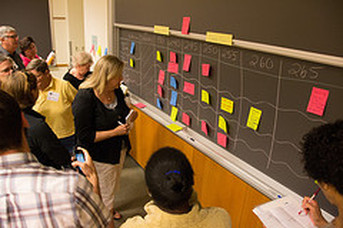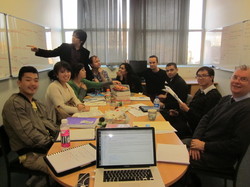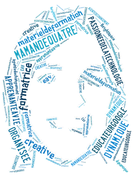
As a teacher, I hated collaborative teacher inquiry! As a teacher lead, I dreaded collaborative teacher inquiry! Now, as an educational consultant, collaborative teacher inquiry scares me! Yet, I’m asked to participate in them constantly! Why would you hate a practice that has been proven to be a great strategy for professional growth and to enhance student learning, you are probably wondering? Well, I believe the answer is quite simple: my experiences with collaborative teacher inquiry are not really positive.
I often measure the value of what I do or what I try in terms of “profit margin”... My husband works in the manufacturing industry and in that business: time is money. Decisions are made, processes are designed based on profit margin. If the profit margin is not big enough or potentially big enough, the process doesn’t cut it! This analogy reflects how I feel about collaborative teacher inquiry: so far, the profit margin has not been enough for me!
I’m not saying that I can’t learn from taking part in a collaborative teacher inquiry with colleagues; I did learn, I do learn. However, I have learned a lot more, in a lot less time, trying a new strategy with my students and getting their feedback. “Let’s try it again this way, let’s try something else now class; what do you think?” And then, I would go back home, reflect on what my students did, did not do? I would research a little more on what I wanted to do or simply look for new ideas, adapt, modify and go back and try. Sometimes, it was a huge success and I kept that strategy, that practice going. Other times, well, it was a complete flop! And that was ok! We learned something! I would inquire more about it on the Internet (I loved the arrival of YouTube for example of modeling!), ask a colleague who had maybe tried it or did something similar. And, try again!
I also feel that I have a much bigger “profit margin” learning every day, from emerging problems, situations in which I am immersed in than, if I can qualify them this way, the setup collaborative teacher inquiries I have been part of. I am one of those people who always have their learning antennas turned on. So, I would hear a comment in the lunch room and wonder: what could I do with that? I see an activity being done by another colleague and I ask questions: can you show me how you do that? I would talk to a friend at the grocery store and think, mmmm, that could be interesting? Who wants to go to that training: I will! You are invited to come and see … ok, I will be there! And now, with the richness of the educational universe open to us and the PLN we can develop … professional growth is exponential! Really, I feel like I am in a collaborative peer inquiry every day! And I love it! … Then, why am I still so uncomfortable with collaborative teacher inquiry?
Soon, I might have to facilitate a more “directed” collaborative teacher inquiry. As I am preparing this professional development opportunity, I am asking myself : why don’t I have positive memories of the collaborative teacher inquiries I took part in? Is it because I don’t have the right mindset? Is it because it suits a certain learning style that is not in tune with me? Is it because I was often the teacher volunteering to do the lesson because I did not mind being watch and didn’t get enough time to observe? Is it because I felt I did not get enough constructive comments? Is it because I often felt that it wasn’t enough for me, I wanted to go farther? Maybe I was not relating enough to the subject of the inquiry, the observations we wanted to make? My needs were not really fulfilled so I was disengaged? Is it because I feel like am living a collaborative teacher inquiry every day that it does not feel as fulfilling to me? Maybe the inquiry needs to be differentiated to meet the needs of everyone? Maybe the format needed to be looked at and colleagues peered differently? Inquiry is a strategy for professional growth, maybe it just was not the most efficient strategy for the learning we wanted to do? All of those? A few of those factors together? None? Something else?
Soon, I will have to facilitate collaborative professional growth sessions with a group of teachers. I want our experience to be positive. I want us to feel that the time we spend is well worth it. I want us to grow as professionals. I want us to enhance the learning of our students. How can I make sure to make this experience a positive one for the educators I work with and for myself as well? I would love to hear from you to help me facilitate this positive learning experience : tips, past experiences we can build on, strategies … ?
I will make sure to write about my experiences. Stay tuned!



 RSS Feed
RSS Feed